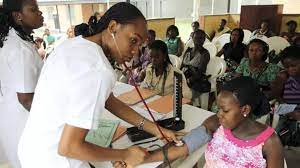The Association for Fertility and Reproductive Health (AFRH) in Nigeria says the country is getting it right in the area of fertility treatment, as many people come from outside the country to seek treatment.
President of AFRH Dr Ibrahim Wada who stated this in Abuja weekend while briefing journalists as part of activities to mark the beginning of 2022 World Fertility Month, said the association is working hard in the interest of the childless in Nigeria.
“People are coming willingly from abroad to Nigeria to undertake fertility treatment. It shows that what we are doing is good and I am pleased with the advanced technology,” he said.
According to him, the association will leave no stone unturned to bring help to couples looking for children.
He said, “Today marks the beginning of World Fertility Month, and we intend to let our country know that more than 80 million people in the world are childless, they are suffering, they want to have children but they cannot. In our country Nigeria, over 1 million at any given time are childless and it is our responsibility to make that portion of the society happy and fulfilled and the association will leave no stone unturned to bring succor to those who are childless.”
Dr Wada said the key concerns of accessibility, affordability, quality and ethical practice in fertility treatment are top on the agenda of the AFRH.
“We want to bring awareness to the plight of the childless and also educate our members on the importance of maintaining the highest standards in looking for solutions.
“We want to make sure that the entire population is covered not necessarily by affordability that is ability to afford but to look for ways and means to bring this high technology to the doors of those who need it.
“We have a duty to self-regulate, we want to make sure that our guidelines and standard of practice developed within the ethical provisions are followed. This is an area where people get exploited unnecessarily and our association is against that.
“So we have guidelines that ensure that whatever our members do as individuals or as institutions is acceptable by international standards. This high level technology and there are all sorts of people that want to get involved, we hold educational sessions often to bring our members up to speed with modern practice in the field. We want to make sure that we self-regulate.”




